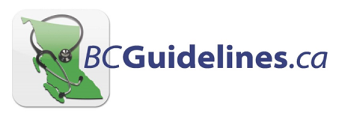Emergency
- Accidental Hypothermia: Evaluation, Triage and Management - BC Accidental Hypothermia Working Group: see Partner Guidelines
- Appropriate Imaging for Common Situations in Primary and Emergency Care (2019)
- BC Imaging Guidelines for Major Trauma - Specialist Trauma Advisory Network: see Partner Guidelines
- Severe Traumatic Brain Injury - Specialist Trauma Advisory Network: see Partner Guidelines
- Trauma Guidelines: Pelvis - Specialist Trauma Advisory Network: see Partner Guidelines
- Trauma Guidelines: Spleen - Specialist Trauma Advisory Network: see Partner Guidelines

